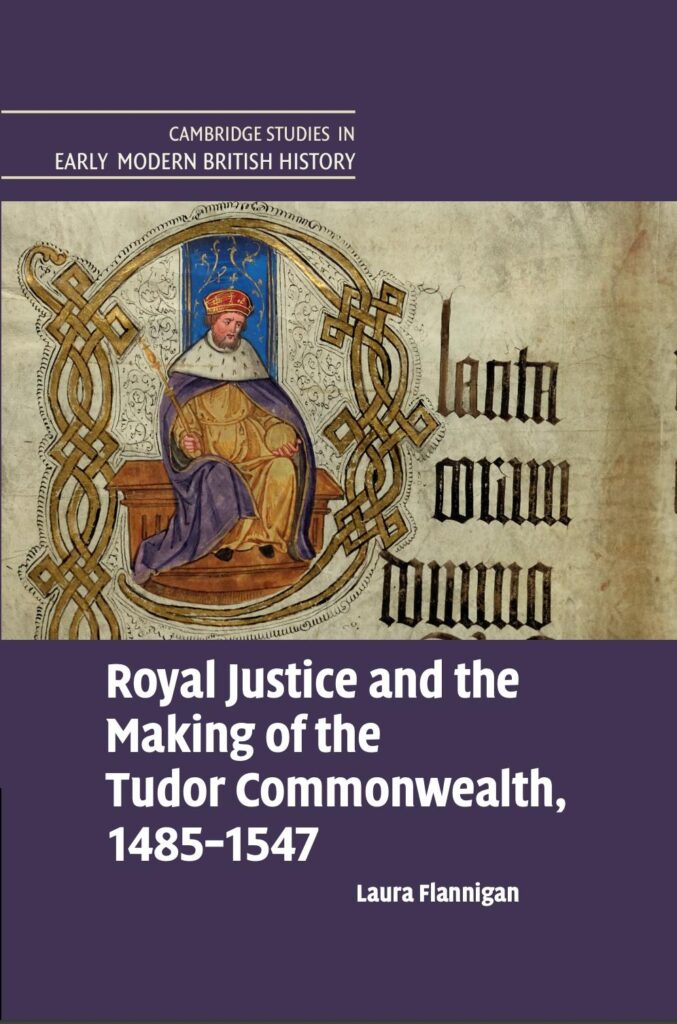In late 2023, Laura Flannigan published Royal Justice and the Making of the Tudor Commonwealth, 1485-1547. She provides insight into writing her book and very helpful advice about turning a thesis into a book.
Could you provide a brief overview of your book for readers who may be unfamiliar with your area of expertise?
My book re-examines the relationship between Crown and people under Tudor monarchy. Most people with an interest in this period feel they know something about the lives and reigns of monarchs like Henry VIII and Elizabeth I, whether in terms of their political sway, cultural influence, or personal relationships. My book presents findings from original research which reveals just how much the early Tudor kings, Henry VII and Henry VIII, were expected to deliver justice to their subjects personally, too—and just how often they did so. More specifically, it recounts the history of a royal tribunal called the Court of Requests, based on study of its surviving archive.
What motivated you to write this book?
The book is the product of doctoral research I completed at the University of Cambridge. I was motivated to work what was quite a technical piece of writing into a more readable monograph for two reasons. Firstly, the early Court of Requests had never received a book-length study, and early Tudor politics has rarely been examined from a social-history perspective, so there was a gap in the market. Secondly, and more pragmatically, turning a thesis into a book is the logical next step for a post-doctoral researcher in History—it is an expectation in the field, and for the job market. That didn’t lessen the experience of writing it, though.
Your book explores the archive of the royal Court of Requests. Could you tell us more about this and your approach to delving into this archive?
The surviving paperwork of the Court of Requests is held at The National Archives (formerly the Public Record Office) in Kew. It consists of petitions submitted to the court by complainants, answers made by accused parties, and the decisions of the king’s judges. All told this material, amounting to hundreds of thousands of individual documents and covers almost 150 years of English history, from the late 15th century to the mid 17th century, when the court was dissolved. I was fortunate that for the period I was interested in—1485 to 1547—there are just a few thousand cases to study. My approach was to read all of the relevant paperwork and try to tell as complete a history as possible of the court’s formative years, in terms of its functions, its personnel, its litigants, and the sorts of judgments it delivered.
Your book examines the role of ordinary people in relation to a judicial revolution during the Tudor period. To what extent did ordinary people shape the early modern concept of justice?
One of my main arguments is that the emergence of new royal courts like Requests in the late 15th and early 16th centuries was in response to the demands of petitioners turning up at the royal household. This runs against older scholarship which argued for the reform-minded genius of men like Thomas Wolsey and Thomas Cromwell in most of the institutional innovations of these years. I argue that ordinary people shaped the procedures of justice, especially since their petitions initiated process on a case by case basis and, as they accumulated, encouraged greater routinisation of the court’s business. More than that, though, my book also examines how the court’s judges responded to criticism of their expertise and jurisdiction, often levelled at them by ordinary people called in as defendants. In that sense, the activity of this governmental institutional was surprisingly sensitive to public expectation and opinion.
What key themes are woven throughout your book?
In the Introduction to the book I identify three themes that the research speaks to. The first is the development of early Tudor government, of which the Court of Requests was a part, and the opportunity that a study of this overlooked institution offers for revising our understandings of the course and motivation of that development. The second concerns the role of litigation as a cohesive force for society and government, with people from across the social strata involved in complaining and resolving disputes and with the Crown’s responsibility for the good of the realm fulfilled in the process. The third theme is the complexity surrounding the administration of justice, and the presence of sustained criticism of Requests and institutions like it from very early on.
What would you say is the main contribution of your work?
All told, its primary contribution is a more socially holistic view of Tudor England, taking in not just monarchs and ministers but also the vast majority of people living outside of the governing elite (some very poor), the local clergymen and officials tasked with investigating cases on the ground, and labourers and farmers who were called in as witnesses. It demonstrates how often the wider public came into contact with the Tudor government, what they could gain from it, and where they might criticise it. It also charts this phenomenon from the 15th to the 17th century, crossing the divide between the late medieval and early modern periods in English historiography.
Could you tell us about how you turned your PhD thesis into a book? What advice would you give to those aspiring to undertake a similar process? Any tips on approaching publishers would be very helpful.
The process for me was fortunately very efficient, taking about three years between initial contact with a publisher and publication of the book. It started with approaching the relevant commissioning editor at my chosen series within Cambridge University Press, and submitting a fuller proposal from there. My general advice would be to have confidence in pursuing your project: ask peers and mentors for advice on everything from presses to proposals to marketing, and request clarification about the behind-the-scenes procedures whenever needed. As for the writing-up process, it helped me a lot to go back for another round of archival research, and to do this alongside writing rather than as a separate phase. Getting back in touch with the documents helped to make the history come alive again, and meant new findings were always emerging to be added to the text.
Finally, could you share any upcoming projects that you’re involved in?
I’m continuing to research knowledge and understanding of litigation in late medieval and early modern England. One of my current projects involves the study of 15th century narratives about long-running disputes fought through the law, written by gentlemen on their deathbeds; another examines legal paperwork and template documents copied into commonplace books—personal notebooks—by people in this period, in a bid to figure out what they might have known about the law before submitting suits to it. Otherwise, I am working with some colleagues on an edited volume introducing new researchers to historical English legal records.
Laura Flannigan is a Junior Research Fellow in History at St John’s College, University of Oxford.

